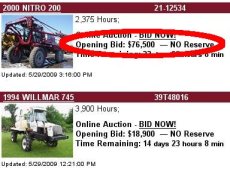In a March episode of the Auction Podcast, we posited that it is wise to have a policy of starting every item at $10 for Internet bidding.
If your minimum bid at a live auction is $10, set the minimum bid for the Internet bidding to be $10. For every item. For every category from coins to real estate. For every auction. Every time.
The logic, of course, is that it looks suspicious to have starting bids that are anything other than the lowest bid an auctioneer would take at a live auction. If your lowest bid is $5, we reasoned, you should start the Internet bidding at that price since the bidding activity generated by a real auction will quickly advance the bidding to more reasonable prices.
In our summer post called Publications shouldn’t try to be auctioneers, we mentioned in passing that Sandhills Publishing – the folks behind TractorHouse, MachineryTrader, TruckPaper and others – completely missed the concept that there isn’t a difference between a high opening bid and a reserve on assets.
Today, we’re going to get right down to the concept that a starting Internet bid is a reserve, plain and simple.
A reserve price is a price below which the seller won’t complete the transaction. An opening bid is a price below which the auctioneer won’t accept bids. A starting Internet bid is a price, entered into bidding software by the auctioneer, that prevents the bidding software from accepting a bid lesser than the starting Internet bid. Some times the software refers to the starting Internet bid as an opening bid, since the two are functionally the same.
If an item is selling at auction, the auctioneer must accept a bid in order to sell it. If the reserve is the lowest price a seller will accept, then all bids below this price are invalid. Because the auctioneer must receive bids to present them to the seller for acceptance, if an opening bid is used then all bids below the opening bid are invalid since the bidders have no way to submit them. Whether the bids are invalid because the seller won’t complete the transaction or the auctioneer won’t accept them doesn’t change the functional equivalence of an opening bid and a reserve from the perspective of the transaction. If it walks like a duck…
So if all opening bids are reserves, are all reserves opening bids? Many times auctioneers allow items with reserves to feature bidding activity below the reserve in hopes that the price will advance beyond the reserve, allowing the transaction to occur. This practice seems a little fundamentally disingenuous to us, but it is quite common in the industry. While many auctioneers are honest and upfront about the reserve status of the items they’re selling, we mentioned in September that there are still auctioneers who try to be sneaky and use house numbers or fictitious bidding accounts to protect the reserves on the items unbeknownst to the bidders. This practice is absolutely not what we’re advocating.
What we are advocating is that auctioneers understand that a minimum bid is functionally no different from a reserve. A starting bid and a reserve both invalidate all lesser bids. A $100 starting bid on a $10,000 vehicle means that the vehicle has a $100 reserve. Such an auction could not honestly and legitimately be referred to or advertised as absolute or without reserve.
